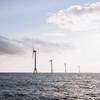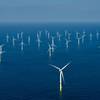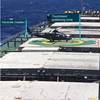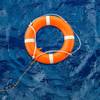No stranger to the cruising industry, Pamela Conover, president and COO of Cunard Line Ltd. Could undoubtedly be the reason behind the company’s continual ability to capture and hold on to the rich British history that it has sustained since its establishment in 1840. More than 150 years later, Cunard, with Conover’s leadership continues to uphold this identity specifically with its illustrious 1,131-ft. (345-m) ocean liner Queen Mary 2. Scheduled for delivery in 2004, the vessel promises to be reminiscent of the glory days of when the trans-Atlantic crossing ruled the seas.
Queen Mary 2 is arguably the most prestigious cruise project to date. The vessel, which will measure 1,131 ft. (345 m) with a 131-ft. (40-m) beam, will be constructed by French shipyard Chantiers de l’ Altantique at for $780 million. Last month Conover made history when she pulled the switch at the shipyard, making the first steel cut on the historic vessel. Conover, along with Patrick Boissier, chairman and CEO of Alstom Chantiers de L’Atlantique, shook hands proclaiming their desire to produce a vessel that will be the signature of British style, as well as one that sets new technological standards.
Conover credits her design and newbuild team at Carnival Corp., specifically lead designer Stephen Payne, who along with Tillberg Design, has been fastidiously working to develop this vessel into more than just a collection of steel and machinery. “In terms of construction, everything is handled by our experienced corporate shipbuilding team, which is led by Stephen Payne in London,” Conover said.
True to the point that while Cunard is concentrating on its current QM2 contract, as well as an additional contract that was signed with Fincantieri in December 2001, Conover maintains that the line continues to forge ahead with the upkeep of its signature vessels – Queen Elizabeth 2 (QE2) and Caronia. “Cunard is a brand of British heritage,” Conover said. “We have a long history of operating ocean liner ships on trans-Atlantic crossings – thus differentiating it as its own specific brand (the rich British history).”
Challenging as it may be to upkeep this status symbol, Conover, who cites that there is not one specific portion of her position that she can pinpoint to be “ultimately challenging,” she however expresses that the sheer desire to run a good company is a challenge that she experiences every day. “I don’t think there is one thing that I could single out to be a challenge,” Conover said. “But the three things that I concern myself with most are our guests, shareholders and employees. If all these things are taken care of, then everything else will fall into place.”
A Headstrong Executive
It may initially be assumed that most positions of power in the cruise industry, and the maritime industry for that matter, have traditionally been held by males. “Not so,” says Conover. “From my perspective there are more women in senior level positions in the cruise industry than any other – specifically within Carnival Corp.,” she said.
“Carnival is a results-driven company,” Conover said. “Therefore it promotes people’s ability to deliver results from a male or female perspective. Simply stated – What can they produce?”
Her involvement with the line commenced as far back as 1988 – six years before she even became a part of the company. At that time, Conover was serving as vice president in the ship finance department for Citicorp, and was later promoted to managing director in charge of Citibank’s North American ship financing business – with Carnival Corp. being her largest customer. This, coupled with the role she played in the development of the North American cruise business, as well as being at the forefront of the original Carnival investment in Seabourn in 1992, was enough for Conover to realize that she had been bitten by the “cruising bug.”
Born in Thailand, Conover spent her formative years in Albury, England, a small village in southwest London, where she was educated. It was in her birthplace, however where she initially developed her love for the ships that sailed along the high seas. As the daughter of a man who worked for a British trading company, Conover was exposed to vessels of all kinds, and had the opportunity to see and visit onboard the vessels that her father dealt with. Perhaps this exposure led to her taking a position with United States Lines, a container shipping company, where she served as assistant treasurer. From there Conover went on to work for Wells Fargo Bank on both sides of the Atlantic – London and then New York, before landing her position with Citicorp in 1988 – a position she would hold until 1994 when she left to become president and CEO of Epirotiki Cruise Line. Carnival Corp., the line that she had familiarized herself with via her experiences at Citicorp, decided to take an investment in that line during that year. Eventually Carnival decided to divest its holdings in the line, and asked Conover to join the corporate parent company.
For now, Conover is continuing to strategize new and different ways of developing the Cunard brand – ways that will continue to set it apart from the rest of the Carnival brands – as well as concentrating on the financial effects of the September 11 terrorist attacks. “In terms of the current state – post September 11 – we are actively working to develop demand for QM2,” Conover said. “I can tell you though that the level of interest has been tremendous, as people are already calling to book cruises on the ship.”
“The whole industry has experienced a drop since the 11th,” she said. “People are concerned about flying and the current trend seems to be that they are also booking later than they used to. Eventually people will start to take vacations again and feel more comfortable about traveling – this will not hurt us on a long term basis.”
In fact, Conover was rather optimistic about the state of the industry, considering the current trends that have predicted by Wall Street analysts as rather glum. “Overall, I’m bullish about the long term,” she said. “There’s a great potential for the large untapped market of consumers, who haven’t taken a cruise vacation. Our job is to get the message out there to change that notion.”
Subscribe for
Maritime Reporter E-News
Maritime Reporter E-News is the maritime industry's largest circulation and most authoritative ENews Service, delivered to your Email five times per week










